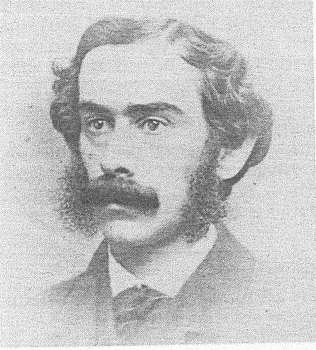Lindley Hoffman Miller: A Brief Biography
Lindley Miller was born in Morristown in 1834, the son of Jacob W. Miller who served as a U.S. Senator of the Whig Party from New Jersey between 1841 and 1853. His mother was the former Mary Louisa Macculloch, daughter of George P. Macculloch, who designed and built the Morris Canal.
Miller graduated from Burlington College in Burlington, N.J. in 1854, an institution co-founded by his grandfather. He failed in an effort to get an appointment as a cadet in the U.S. Military Academy at West Point, despite the influence of his father. In 1855 he was admitted to the bar. Even as a young man, he was a noted orator and poet.
He was residing and practicing law in New York City at the outbreak of the Civil War in April 1861. He was among the first to volunteer for service, joining the New York Seventh Regiment Company F as a private. Also serving as a private in the same Company was Robert Gould Shaw who later commanded the 54th Massachusetts Volunteer Infantry Regiment of African Americans made famous by the 1989 movie Glory.
After serving a year in the Washington, D.C. area, Miller in May 1862 married Anne Huntington Tracy, known as "one of the beautiful Tracy girls." The couple was living in New York City, and he was stationed at the regimental armory. In the summer of 1863, Anne Tracy Miller was pregnant and close to delivering their child. When the Draft Riots broke out in July in New York City, her father took her out of the city to the Catskills, as Lindley Miller was serving with his guard unit at the armory. In August, Anne Miller died after childbirth, at age 24, and their infant child died a week later. To assuage his sorrow, Lindley Miller decided to seek a military commission, and agreed to serve as an officer with a “colored” regiment receiving a commission as Captain in the First Arkansas Volunteer Infantry Regiment (African Descent) in November 1863.
While serving with the First Arkansas he wrote the "Marching Song of the First Arkansas Colored Regiment" known today through the song sheet issued by the Supervisory Committee for Recruiting Colored Regiments in Philadelphia. The "Song of the First of Arkansas," written in dialect, was one of several broadsides issued by the Committee for recruitment purposes.
The First Arkansas Volunteer Infantry Regiment saw action in a skirmish at Mound Plantation on June 24, 1863, and action on June 29 at Goodrich’s Landing, where the unit remained for post duty through January 1864. The unit then took up duty at Haines Bluff, District of Vicksburg, until May 1864.
Lindley was so well appreciated by his superior officers that he was soon promoted to the rank of Major in a new colored regiment in Missouri. Miller never took up his new commission as Major with the Missouri regiment. On leave to his home due to illness, he died on June 30, 1864, at age 30, from a fever he had acquired during his military service with the First Arkansas.
_________________________________________________________________________________________________________________________________
To see the scan and transcription of the letter, click on the green box to open the transcription, then click on the link at the top to open the letter scan in a new window.
_________________________________________________________________________________________________________________________________
Transcriptions were completed by Rose Feiwal during her fall 2020 Archives Internship.
George Perot Macculloch (GPM) to Lindley Hoffman Miller (LHM) (A2045)
December 13, 1850
Written to his grandson Lindley, a student at Burlington College. George asks the question of whether a state has any right to secede from the Union as a suggestion for a speech being prepared by Lindley. George feels that the Union may be dissolved if found inexpedient, but in practice "long may it continue".
Mary Louisa Miller (MLM) to Lindley Hoffman Miller (LHM) (A2004)
c.1851
His mother, Mary Louisa, strongly objects to Lindley's desire to enter West Point after finishing Burlington College. His father, Senator Jacob Miller, can procure a cadetship at West Point for Lindley, but she feels that Lindley does not have the temperament to be a soldier. He finds it difficult to obey orders. He should be a writer or a civil engineer if he needs adventure.
Jacob Welch Miller (JWM) to LHM (A2033)
May 1, 1852
Lindley's father, Senator Jacob Welch Miller, sending $15.00 for pants. Lindley shouldn't neglect "the legs" at the last of his "collegiate run". Lindley was visiting his brother, Henry, at Annapolis.
GPM to LHM (A2047)
June 14, 1852
Mortified at "miscarriage of our West Point aspirations", but isn't it better to be a civilized lawyer than a soldier serving on a wild frontier? To be a lawyer, Lindley must quell his "natural tendency to fun". "Professions of the sword for our family...from Country Doctors and Silky Parsons, good Lord deliver us!"
JWM to LHM (A2034)
June 27, 1852
His father sending $5.00. He has been too busy nominating General Scott to write. Hopes to visit Lindley at Burlington on way home from Salem with Mary Louisa.
LHM to MLM (A2011)
January 9, 1857
Writing to his mother, Lindley is delighted at George's engagement to Lizzie Hoffman.
LHM to Jack Miller (A2029)
December 1, 1858
Writing to his brother, Jack, with brotherly advice and wishing to be home for Christmas with the family.
LHM to MLM (A2014)
October 5,1861
This early letter to his mother explains Lindley's desire to serve in the army. He expressed his commitment to the Union cause and gave his name to the "number of the Seventh". (7th New York Volunteers)
LHM to MLM (A2015)
June 3, 1862)
Lindley writing from encampment in Baltimore offering condolences for a child’s death.
LHM to MLM (A2016)
August 2,1862
Written to his mother from Baltimore with verses for his wife Annie. She should show them to Eddie (sister) or Harry (brother). Brother Jack's letters are improving. In the summer of 1862, Lindley was camped with the Seventh Regiment New York National Guard near Baltimore.
LHM to MLM (A2017)
August 31,1862
On August 29, the Seventh Regiment returned to New York City to a hearty welcome as it marched up Broadway. Lindley was eager to get home to his bride, Annie Tracy whom he married days before being “mustered in” for duty.
LHM to MLM (A2018)
October 5, 1862
Writing to his mother about his father’s death commenting that “Father was purest patriot with his love of law and the Constitution”. Letter contains further recollections of him.
LHM to MLM (A2013)
January 9,1863
Writes to his mother that he is working hard. He strongly believes that “we must fight to subdue the Southern rebels” and mentions that NYC has called for 20,000 volunteers for the army.
LHM to MLM (A2020)
July 18,1863
Writing to his mother from New York City, Lindley graphically describes the measures he and his wife, Annie, took to protect their Negro servants during the New York City Draft Riots. He writes to his mother..."If could have remained with her [Annie], I should not have made her go [out of town]. But I cannot tell when I can leave the armory". Her father took Annie, close to term with her first pregnancy, away to the Catskills. Within weeks, both Annie and her newborn son would be dead, and the course of Lindley's life tragically altered.
E.M. Hitchcock to LHM (A2066)
September 19,1863
Hitchcock discusses the impossibility of obtaining an officer's post in the regular army and suggests “colored” regiments as a place to find a post. He writes that the authorities are attempting “…to secure a fine body of officers for the colored regiments”.
Frank Tracy to General Lorenzo Thomas (A2067-1)
October 8, 1863
Lindley's father-in-law's brother writes recommending Lindley for appointment leading Black troops to General Lorenzo Thomas at Vicksburg. General Thomas was in charge of the recruitment of Black troops.
LHM to General Lorenzo Thomas (A2067-2)
October 14, 1863
Lindley sent General Thomas a letter detailing his fitness for the position writing of his experience in drill and camp life with 7th Regiment. He expressed his “… entire faith in capacity of the colored races and belief in perpetuity of the Republic”.
J.M. Zabriskie to General William Franklin (A2063)
October 13, 1863
Writing to the General he stated, “I take pleasure in introducing to you Lindley Miller Esq. – He is the son of Senator Miller, a fine lawyer in Wall Street and joined the 3 Months Men. He is now going to New Orleans, and whatever kindness you may show him, will be considered a great favor to all his friends who remember you with great appreciation”.
Steven Tyng to General Lorenzo Thomas (A2065)
October 20, 1863
Writing to recommend Lindley for a commission in a Black regiment as it is his wish to do so.
LHM to Jack Miller (A2030)
October 24, 1863
Writing to his younger brother referring to how "it might have been in other times". Brotherly advice as to "trials and temptations" of college life. Right, unselfishness more important than popularity.
Official appointment from General Lorenzo (A1050)
November 5, 1863
Lindley Miller's appointment as Captain in the First Regiment Arkansas Volunteers of African Descent signed by Adjutant General Thomas.
General Lorenzo Thomas to LHM (Misc064-21)
November 5, 1863
Copy of letter from General Lorenzo Thomas concerning Special Order No. 93 appointing Lindley Miller to Captain First Arkansas.
General Lorenzo Thomas to LHM (A2069)
November 6, 1863
Enclosing letter of appointment as Captain. Regards to the Tracys. The General finds difficulty in worshiping. “No Episcopalians due to Southern sentiments”. He has to keep on the move to New Orleans.
LHM to Jack Miller(A2031)
November 21, 1863
Addressed to Midshipman J. W. Miller Newport R.I.
Lindley writes of his commission as Captain in First Arkansas volunteers. He is to leave for New Orleans. Sends a photograph of his wife Annie with adieus and exhortations to duty or religion.
Receipt signed by Edward Levelich (A2071)
December 7, 1863
“New Orleans December 7, 1863 Received from Captain L.H. Miller one package containing ten thousand dollars in legal tender”.
LHM to his mother (A2026)
January 9, 1864
In his first letter from the front, Goodrich’s Landing, Louisiana, to his mother, Lindley is happier serving in the army. He describes camp life and his duties as Captain. The deserted cotton plantations need caretaking, and there is unprecedented cold and ice in Mississippi River. He writes asking for warm clothes.
LHM to MLM (A2022)
March 5, 1864
Written at Haynes Bluffs Mississippi, Lindley tells his mother that he is going to Vicksburg. He is taking quinine and enjoying his duties. Leisure is hard, but he needs to re-tone. Camp will stay put for a while. He announces a great novelty, condensed milk and other canned "goodies.
LHM to MLM (A2021)
March 21, 1864
In this prophetic letter, Lindley reassures his mother about General Sherman's expedition because battles "...cost far less loss of life than disease." (He later died from typhoid) He goes on to describe his camp and living conditions.
LHM to MLM (A2023)
March 27, 1864
This letter provides personal observations of Vicksburg after it had been captures by General Grant. Lindley was boarding with a female rebel. He notes that crowds of troops are going on an "expedition" with Sherman. He comments on the caves where people sheltered from bombardment from the Union fleet.
LHM to MLM (A2024)
March 30, 1864
Camped on the Yazoo River Mississippi, Lindley is feeling at the top of his prowess as an officer with his increasing responsibilities such as the construction of a new outpost. He also expresses regret for the war's destructiveness on the local environment and further regrets the Regiment's impending move from a "healthful and beautiful camp. He discusses his Regiment's (46th US Colored Infantry) battle with the rebels and their withdrawal to Vicksburg.
LHM to MLM (A2025)
May 8, 1864
Still stationed at Vicksburg, Lindley's family has congratulated him for his promotion to Major. He longs to join the fighting instead of "digging". He notes the desolation of plantations and expresses sympathy for negroes. He is proud of the bravery of his "colored" troops and proud of his men's respect. He dreams of a visit to Macculloch Hall in uniform.
LHM to MLM (A2028)
May 22, 1864
Lindley to take his promotion to Major at St. Louis Mississippi via a signed order of General Thomas. This letter, written from Vicksburg, is his last known correspondence.
Mary Louisa Miller to her son Jack (A2036)
June 30, 1864
Lindley's mother, Mary Louisa, writing from New York City to her youngest son, Jack, announces "Lin's imminent death" from typhoid. Eddie, Fanny, and George attending him. Asks that Jack pray..."that she may not be rebellious under this fearful trial."
Mary Louisa Miller to her son Jack (A2039)
July 3, 1864
She writes to her son, Jack, that Lindley's ..."earthly life has closed and that he has gone to his Savior and to his sweet wife and child". She describes a painful scene of delirium in which Lindley was..."continually commanding his men."

